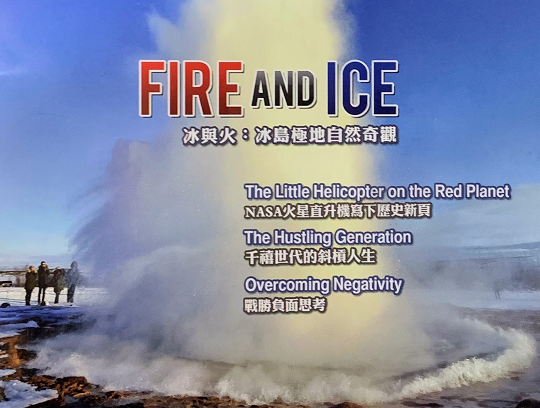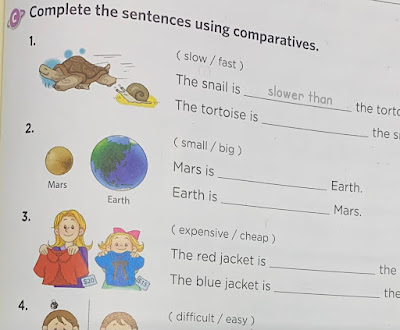The first synchronicity that registered with me as such had to do with Robert Frost's poem "Fire and Ice." It happened around 1991, and I discussed it in my 2019 post "
Fire and Ice."
I was reminded of this today when I received an English magazine with this on the cover:

I also noticed "The Little Helicopter on the Red Planet" in connection with "
The Gospel of Luke on Lobsterback." In that post, I discussed the transportation of the "Gospel of Luke" from "Britain" to "Armorica" on "lobsterback" -- all in scare quotes because probably none of those terms is meant literally. "Snails" were involved in this transportation. A
helicopter could also be used to transport things across the sea, and the first element in that word is the combining form of
Helix, which is a genus of snails. In the post I noted that
lobsterback was historical slang for a British soldier, referring to the red coats they wore, and that previous dreams and syncs had introduced the idea of "Britain as another planet." The planet the lobsterbacks are from would naturally be the Red Planet, just as the planet the little skinny creatures are from is the Little Skinny Planet. In fact, in my post "
Britain as another planet," I explicitly bring in Mars, referencing, among other things, a Muse music video featuring "a planet that looks like Mars but turns out to be Britain."
Coming back to the main cover story, though, it sent me back to my 2019 post, which included a still from This Is Spinal Tap. (That absolutely perfect movie, together with The Princess Bride, is why I will never denounce Rob Reiner, no matter how much of an ass he has made of himself since then.) The scene I was referencing was this:
Derek Smalls says of his bandmates:
We're very lucky in a sense that we've got two visionaries in the band. You know, David and Nigel are both, like, like poets, you know, like Shelley and Byron and people like that. They're two totally distinct types of visionaries. It's like fire and ice, basically, you see, and I feel my role in the band is to be kind of in the middle of that, kind of like lukewarm water.
Rewatching the clip just now, I noticed the Luke reference ("lukewarm water") and the names Shelley and Byron. Byron is, by a very wide margin, the English-language poet I have read the most and whose poetic style has most influenced my own. I haven't read too much of him recently, but just a few days ago, as documented in "
No more a roving," I was nudged by Claire to take down his collected works and see what page was bookmarked. It was "So, we'll go no more a roving." This poem is very prominently featured in Ray Bradbury's
Martian Chronicles, so that's another link to the Red Planet.
I'm fairly indifferent to Shelley as a poet, though he's been in the sync stream from time to time, mostly in connection with "The Sensitive Plant." When I heard the name Shelley in the video, though, my thoughts immediately went to a children's book I have at my school called What's in My Classroom? It's a very short, very simple book, only 10 pages, in which children give each other clues and try to guess what in the classroom they're thinking of. It ends with this:
Shelly appears to be a red-eared slider, a fairly close relative of the box turtle. In "
Fruit grown from a ruby in a cup (with a turtle)," I recount a vision involving a box turtle and compare it to a story by William Wright about a Herbie the Hamster. Herbie lives in a glass enclosure which apparently has no lid, because in the end he succeeds in climbing out of it. Shelly the Turtle, as you can see, also lives in a glass enclosure with no lid, and also gets out of it in the end.
Also, take a look at the books the children are reading on p. 9. The boy's book has pictures of golden autumn leaves -- a major theme here recently. The girl's book has golden flowers, something William Wright has just posted about in "
Gold and Red Stars: El-Anor and the Sawtooth Stone." His "Red Star" reference is of course another link to the Red Planet.
In my story, shoes are associated with reach the Peak, just as changing one's shoes in William's school is also required to ascend the stairs to the classroom. The classroom reference at the top of the stairs is interesting because Isaiah mentions that when the Mountain of the Lord's House is again established in the top of the Mountains, people will want to go there so they can learn, like one does in a classroom.
Update (later the same day): Hours after posting the above, I was preparing for a class and saw these three pictures:
All together on the page, there’s a turtle, a snail, Mars, and a red coat (“lobsterback”).
I also got word that a new student is going to join one of my classes, and the English name he uses is Byron.
Then this evening I checked Slate Star Codex for the first time in months and found a newly posted review of Byron’s Don Juan written in the style of the poem itself.
(Don Juan has its moments, but writing it in clunky pentameter stanzas was a mistake. Tetrameter with an irregular rhyme scheme suited Byron perfectly, and a Don Juan written in Giaour-style verse would have been brilliant. No, I’m not going to do it myself.)









